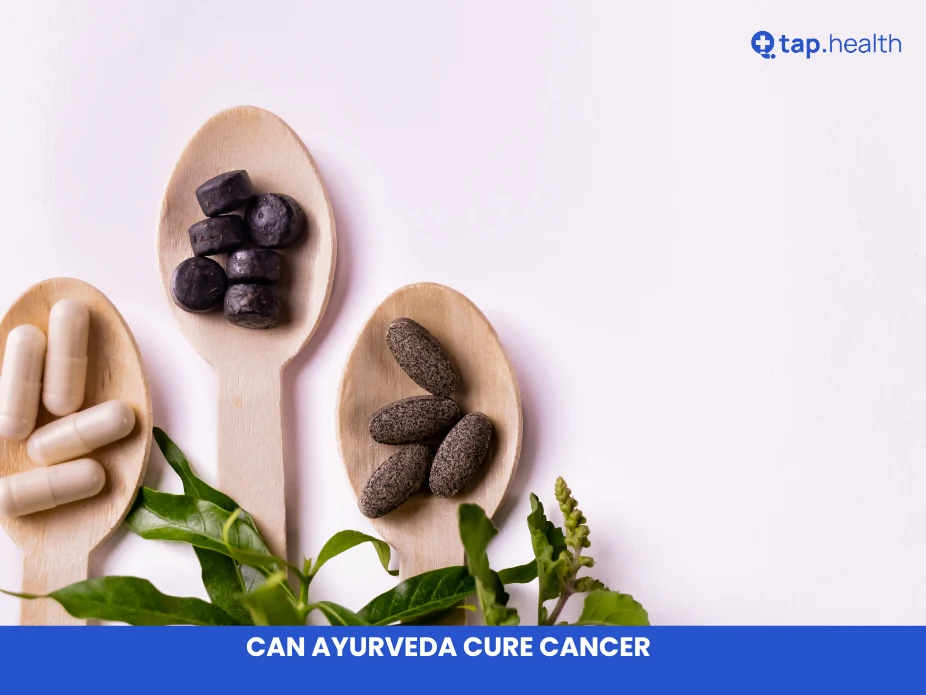Cancer is one of the most challenging health issues worldwide, prompting many to seek alternative treatments alongside conventional medicine. Ayurveda, an ancient Indian holistic healing system, is often suggested as a complementary approach. But can Ayurveda cure cancer? In this blog, we’ll explore this question thoroughly, providing clear, evidence-based insights to help you make informed decisions about your health.
Introduction
Cancer diagnosis brings a whirlwind of emotions and questions. Among the many queries is whether alternative medicine, like Ayurveda, can offer a cure. Understanding the role Ayurveda plays in cancer treatment is crucial for patients considering all available options. Let’s delve into what Ayurveda is, its potential benefits, and the scientific perspective on its effectiveness in curing cancer.
What is Ayurveda?
Ayurveda is a traditional system of medicine that originated in India over 5,000 years ago. The word “Ayurveda” is derived from two Sanskrit words: “Ayur,” meaning life, and “Veda,” meaning knowledge. Thus, Ayurveda translates to “the knowledge of life.”
Core Principles of Ayurveda
Ayurveda focuses on maintaining balance in the body through a combination of diet, herbal treatments, yoga, meditation, and lifestyle changes. It emphasizes the balance of three primary energies or doshas:
- Vata: Governs movement and is associated with air and space.
- Pitta: Governs metabolism and is associated with fire and water.
- Kapha: Governs structure and is associated with earth and water.
Maintaining the balance of these doshas is believed to promote health and prevent disease.
Ayurveda and Cancer: Understanding the Connection
Cancer is a complex disease characterized by uncontrolled cell growth and the potential to spread to other parts of the body. Conventional cancer treatments include surgery, chemotherapy, radiation therapy, and targeted therapies. Ayurveda approaches cancer from a holistic perspective, aiming to strengthen the body, enhance immunity, and improve overall well-being.
Can Ayurveda Cure Cancer?
The question “Can Ayurveda cure cancer?” doesn’t have a straightforward answer. While Ayurveda offers supportive treatments that can improve the quality of life for cancer patients, there is no scientific evidence to confirm that Ayurveda alone can cure cancer. It is essential to approach this topic with a balanced view, recognizing both the potential benefits and limitations of Ayurvedic treatments.
The Role of Ayurveda in Cancer Care
Ayurveda can play a complementary role in cancer care, focusing on enhancing the body’s resilience and managing side effects of conventional treatments.
Supportive Therapies
- Herbal Remedies: Ayurveda utilizes various herbs known for their anti-inflammatory and antioxidant properties. Common herbs include turmeric (Curcuma longa), ashwagandha (Withania somnifera), and neem (Azadirachta indica).
- Diet and Nutrition: A balanced diet tailored to an individual’s dosha can support overall health and energy levels during cancer treatment.
- Detoxification (Panchakarma): This involves cleansing procedures that aim to remove toxins from the body, potentially reducing inflammation and improving immune function.
- Mind-Body Practices: Yoga, meditation, and pranayama (breathing exercises) are integral to Ayurveda and can help reduce stress, improve mental clarity, and enhance emotional well-being.
Enhancing Quality of Life
Ayurvedic practices can help manage symptoms and side effects of conventional cancer treatments, such as:
- Nausea and Vomiting: Herbal remedies and dietary adjustments can alleviate gastrointestinal discomfort.
- Fatigue: Adaptogenic herbs and energy-boosting practices can help combat exhaustion.
- Emotional Stress: Meditation and yoga promote relaxation and emotional stability.
Scientific Perspective on Ayurveda and Cancer
While Ayurveda offers valuable supportive care, the scientific community maintains that it should not replace conventional cancer treatments.
Research and Evidence
- Limited Clinical Trials: There is a scarcity of large-scale, rigorous clinical trials evaluating the effectiveness of Ayurvedic treatments in curing cancer.
- Potential Benefits: Some studies suggest that certain Ayurvedic herbs may possess anti-cancer properties. For example, curcumin in turmeric has shown promise in inhibiting cancer cell growth in laboratory studies.
- Safety Concerns: Without proper regulation, some Ayurvedic formulations may contain heavy metals or contaminants, posing health risks.
Expert Opinions
Medical experts advocate for an integrative approach, combining conventional treatments with evidence-based complementary therapies. This ensures that patients receive comprehensive care while minimizing potential risks.
Real-life Scenarios
Understanding how Ayurveda interacts with cancer treatment in real life can provide valuable insights. Let’s explore some stories from India.
Real-life Scenarios
Scenario 1: Rohan’s Journey with Ayurveda and Conventional Treatment
Rohan, a 45-year-old engineer from Pune, was diagnosed with stage II colon cancer. Faced with the decision between solely conventional treatment and integrating Ayurveda, he chose an integrative approach.
- Outcome: Rohan underwent surgery and chemotherapy while following an Ayurvedic regimen that included herbal supplements, a tailored diet, and yoga. He reported improved energy levels, reduced chemotherapy side effects, and a better overall sense of well-being. His oncologist supported the integrative approach, emphasizing the importance of not replacing conventional treatments with Ayurveda.
Scenario 2: Maya’s Experience with Ayurveda as Sole Treatment
Maya, a 38-year-old teacher from Chennai, was diagnosed with breast cancer. Influenced by personal beliefs, she opted to use only Ayurvedic treatments.
- Outcome: Maya faced challenges as her cancer progressed despite Ayurvedic treatments. Eventually, she incorporated conventional treatments, which led to better health outcomes. Her story highlights the risks of relying solely on alternative therapies without medical supervision.
These scenarios illustrate the potential benefits of an integrative approach and the dangers of excluding conventional treatments.
Expert Contributions
Dr. Anil Kumar, a renowned oncologist at AIIMS (All India Institute of Medical Sciences) in New Delhi, shares his insights:
“Ayurveda can offer valuable supportive care to cancer patients, helping manage symptoms and improve quality of life. However, it should not replace conventional treatments like surgery, chemotherapy, or radiation. An integrative approach, where Ayurveda complements standard medical care, can provide the best outcomes for patients.”
Recommendations Grounded in Proven Research and Facts
To effectively integrate Ayurveda into cancer care, consider the following evidence-based recommendations:
1. Consult with Healthcare Professionals
Always discuss any alternative treatments with your oncologist or healthcare provider. They can help you understand potential benefits and risks, ensuring that complementary therapies do not interfere with conventional treatments.
2. Choose Qualified Practitioners
Seek Ayurvedic treatments from certified and reputable practitioners. Proper guidance ensures safe and effective use of herbal remedies and therapies.
3. Use Evidence-Based Therapies
Opt for Ayurvedic treatments supported by scientific research. For example, turmeric supplements with verified curcumin content can offer anti-inflammatory benefits.
4. Monitor and Report Side Effects
Be vigilant about any adverse effects from Ayurvedic treatments. Inform your healthcare provider immediately if you experience any unusual symptoms.
5. Maintain a Balanced Diet
Follow Ayurvedic dietary recommendations tailored to your dosha, ensuring you receive essential nutrients to support your body during cancer treatment.
6. Incorporate Mind-Body Practices
Engage in yoga, meditation, and pranayama to reduce stress, improve mental health, and enhance overall well-being.
7. Stay Informed
Keep up-to-date with the latest research on Ayurveda and cancer. Trusted sources like the World Health Organization (WHO) and National Center for Complementary and Integrative Health (NCCIH) provide reliable information.
8. Prioritize Safety
Ensure that any Ayurvedic supplements or herbs are free from contaminants and heavy metals. Choose products that are certified by reputable organizations.
Factual and Reliable Information
The information provided in this blog is based on reputable sources to ensure accuracy and reliability. Some of these sources include:
- American Cancer Society
- National Cancer Institute
- World Health Organization (WHO)
- AIIMS Official Website
These organizations offer comprehensive information on cancer treatment options, the role of alternative medicine, and guidelines for safe healthcare practices.
FAQ on Can Ayurveda Cure Cancer?
Can Ayurveda cure cancer?
No, Ayurveda alone cannot cure cancer. While it offers supportive therapies that may enhance well-being and manage symptoms, there is no scientific evidence to confirm that Ayurveda can cure cancer. It should be used as a complementary approach alongside conventional treatments.
What Ayurvedic treatments can support cancer care?
Ayurvedic treatments that may support cancer care include herbal remedies like turmeric and ashwagandha, dietary adjustments, detoxification therapies (Panchakarma), yoga, meditation, and pranayama.
Is it safe to use Ayurvedic supplements during cancer treatment?
Consult your healthcare provider before using any Ayurvedic supplements. Some herbs may interact with conventional treatments or contain contaminants. Always use supplements from reputable sources and follow professional guidance.
How does Ayurveda manage cancer symptoms?
Ayurveda manages cancer symptoms by enhancing the body’s resilience and reducing side effects of conventional treatments. This includes alleviating nausea, boosting energy levels, managing pain, and improving emotional well-being through herbal remedies and mind-body practices.
What are the main principles of Ayurveda in cancer care?
The main principles include balancing the doshas, detoxifying the body, strengthening the immune system, maintaining a balanced diet, and incorporating mind-body practices like yoga and meditation to support overall health.
Can Ayurveda prevent cancer?
While a healthy lifestyle advocated by Ayurveda may reduce the risk of certain cancers, there is no definitive evidence that Ayurveda can prevent cancer. Prevention strategies should include regular medical check-ups, a balanced diet, physical activity, and avoiding known carcinogens.
Should I stop conventional cancer treatment to try Ayurveda?
No, do not stop conventional cancer treatments in favor of Ayurveda. Integrative approaches that combine both conventional and complementary therapies, under medical supervision, are recommended for the best outcomes.
Are there any risks associated with Ayurvedic treatments for cancer?
Yes, potential risks include interactions with conventional medications, contamination of herbal products with heavy metals, and lack of regulation in some areas. Always consult healthcare professionals before starting any Ayurvedic treatments.
How can I find a qualified Ayurvedic practitioner?
Seek practitioners who are certified and registered with recognized Ayurvedic institutions. Referrals from healthcare providers or reputable Ayurvedic schools can help you find qualified professionals.
What should I do if I experience side effects from Ayurvedic treatments?
Immediately inform your healthcare provider if you experience any adverse effects from Ayurvedic treatments. They can help manage the symptoms and adjust your treatment plan accordingly.



